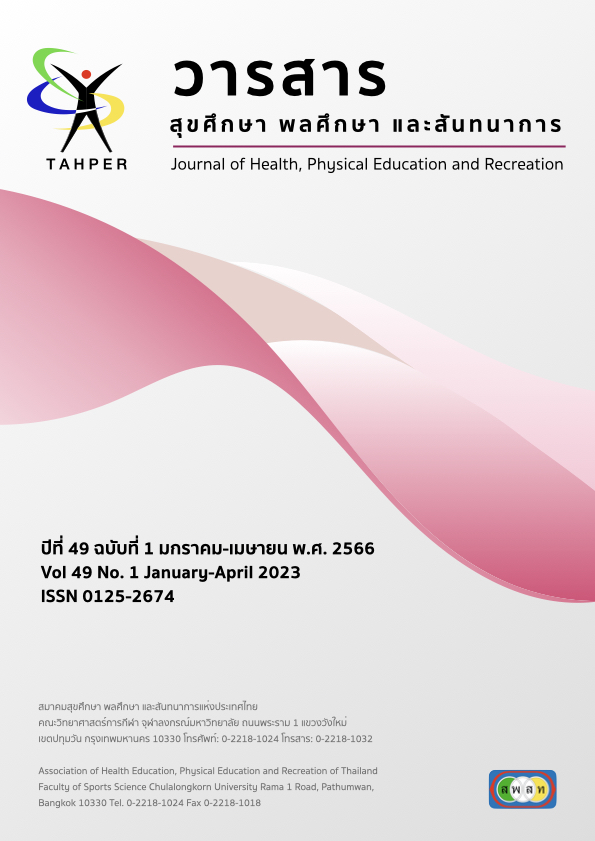Study on the Factors Affecting Technology Acceptance of “SAT Sport Digital Platform”, a Case Study of National Sports Competitions, Srisaket Games 2022
Main Article Content
Abstract
The purpose of this research was to study the factors affecting technology acceptance "SAT Sport Digital Platform", a case study of national sports competitions, Srisaket Games 2022 was a quantitative research. The sample group consisted of 385 people related to the Sepak Takraw. The data were collected by the questionnaire created by the researcher, consisting of general information of the respondents and factors affecting technology acceptance. The confidence value was 1, Cronbach's alpha coefficient was 0.945. The obtained results were statistically analyzed by the computer program to find the frequency, percentage, mean, standard deviation, and analyzed the factors of technology acceptance using statistical analysis of multiple regression at a statistically significant level of 0.05.
The results of the research found that the opinions of the sample on the factors affecting the technology acceptance of the "SAT Sport Digital Platform" found that there were opinions on the perceived ease of use, perceived benefit, attitude towards use, and social influence at the highest level. When considering the standard regression coefficient (Beta), it was found that the predictor variable with the highest Beta value was the perceived benefit factor (Beta=0.216), followed by the attitude towards use factor (Beta=0.204), perceived ease of use (Beta=0.176) and social influence factor (Beta=0.126), respectively, it could explain the technology acceptance of the “SAT Sport Digital Platform” by 39.4% from the both 4 variables into the regression equation all of which were positively correlated with technology acceptance, there was statistically significant at the 0.05 level (R=0.628).
Keywords : Technology Acceptance, SAT Sport Digital Platform, National Sports Competition
Article Details

This work is licensed under a Creative Commons Attribution-NonCommercial-NoDerivatives 4.0 International License.
Critical thinking in journals is the right of the author. The Association of Health Education, Physical Education and Recreation of Thailand is not always required, to create diversity in ideas and creativity.
ความคิด ข้อวิพากษ์ในวารสารเป้นสิทธิของผู้เขียน สมาคมสุขศึกษา พลศึกษา และสันทนาการแห่งประเทศไทยไม่จำเป็นต้องเห็นชอบด้วยเสมอไป เพื่อให้เกิดความหลากหลายในความคิดและความสร้างสรรค์
References
กิตติคุณ แสงนิล และ วิโรจน์ เจษฎาลักษณ์. (2562). การสร้างนวัตกรรมในธุรกิจการให้บริการทางการกีฬา: กระบวนการสร้างมโนทัศน์. วารสารสุขศึกษา พลศึกษาและสันทนาการ, 45(2). 14-32.
ชัยสิทธิ์ ภาวิลาส, เฉลิม ชัยวัชราภรณ์, โดม ภูมิดิษฐ, ณัฐฐาพร อะวิลัย, และ บุญศักดิ์ หล่อพิพัฒน์. (2564). โครงการสลากส่งเสริมคนรักกีฬาต้นแบบ: กรณีศึกษา ตะกร้อดิจิทัลแอปพลิเคชัน. วารสารวิทยาศาสตร์และเทคโนโลยีการกีฬา, 21(2). 111-124.
สุชาติ เพชรเทียนชัย, ศุภวรรณ วงศ์สร้างทรัพย์, และธีรศักดิ์ สร้อยคีรี. (2565). การพัฒนาแอปพลิเคชั่นเพื่อการเรียนรู้ วิชาฟุตบอล สำหรับนักศึกษามหาวิทยาลัยราชภัฎหมู่บ้านจอมบึง. วารสารสุขศึกษา พลศึกษา และสันทนาการ, 48(2). 14-27.
Chang, I. C., Chen, K., & Liu, C.C. (2014). The effects of hedonic/utilitarian expectations and social influence on continuance intention to play online games. Internet Research, 24(1). 21-45.
Chen, H., Rong, W., Ma, X., Qu, Y., & Xiong, Z. (2017). An Extended Technology Acceptance Model for Mobile Social Gaming Service Popularity Analysis. Retrieved March, 12, 2022. From http://doi.org/10.1155/2017/3906953
Cochran, W.G. (1977). Sampling Techniques (3rd ed.). New York: John Wiley and Sons Inc.
Davis, F. D. (1989). Perceived Usefulness, Perceived Ease of Use, and User Acceptance of Information Technology. MIS Quarterly, 13(3). 319-340.
Delone, W., & McLean, E. (2003). The DeLone and McLean Model of Information Systems Success: A Ten-Year Update. Journal of Management Information Systems, 19. 9-30.
Ha, I., Yoon, Y., & Choi, M. (2007). Determinants of adoption of mobile games under mobile broadband wireless access environment. Information & Management, 44(3). 276-286.
Hsu, C.L., & Lu, H.P. (2007). Consumer behavior in online game communities: A motivational factor perspective. Computers in Human Behavior, 23(3). 1642- 1659.
Liu, Y., & Li, H. (2011). Exploring the impact of use context on mobile hedonic services adoption: An empirical study on mobile gaming in China. Comput. Hum. Behav., 27(2). 890-898.
Parasuraman, A., Zeithaml, V.A. & Berry, L.L. (1988) SERVQUAL: A Multiple-Item Scale for Measuring Consumer Perceptions of Service Quality. Journal of Retailing, 64. 12-40.
Seo, Y., Buchanan-Oliver, M., & Fam, K.-S. (2015). Advancing research on computer game consumption: A future research agenda. Journal of Consumer Behaviour, 14(6). 353-356.
Venkatesh, V., & Davis, F. D. (2000). A Theoretical Extension of the Technology Acceptance Model: Four Longitudinal Field Studies. Management Science, 46(2). 186-204.


